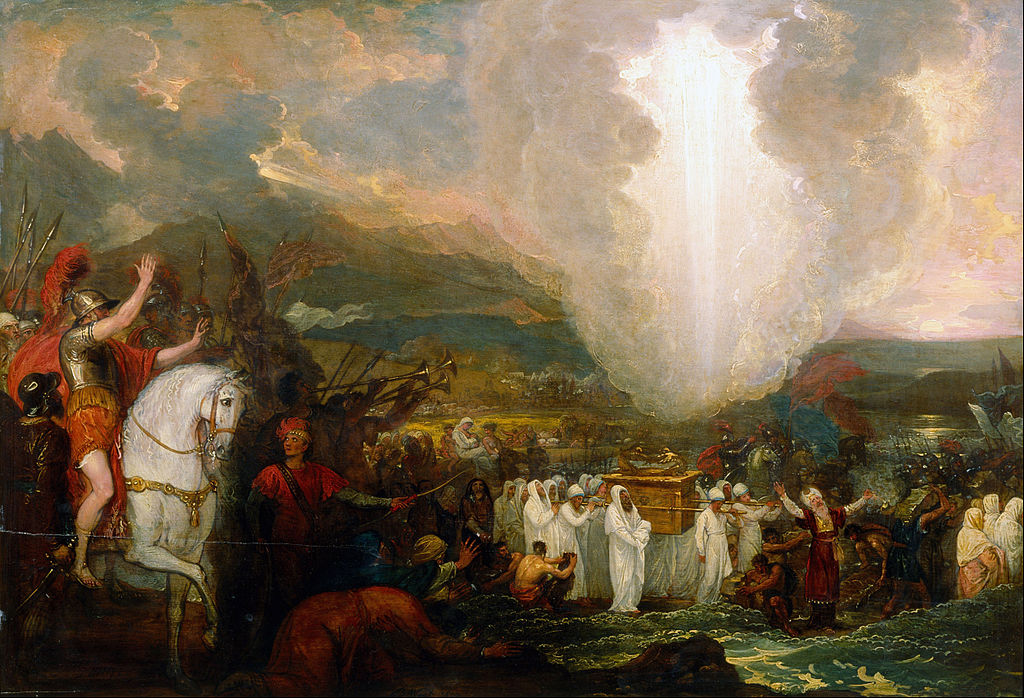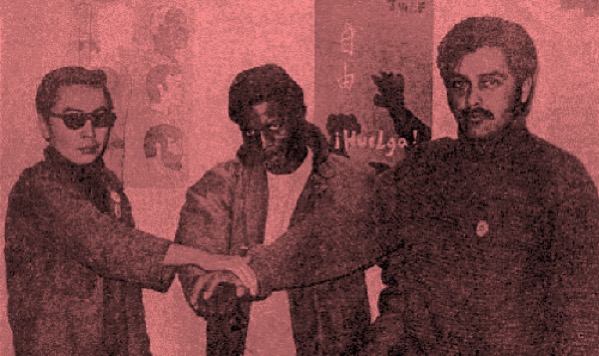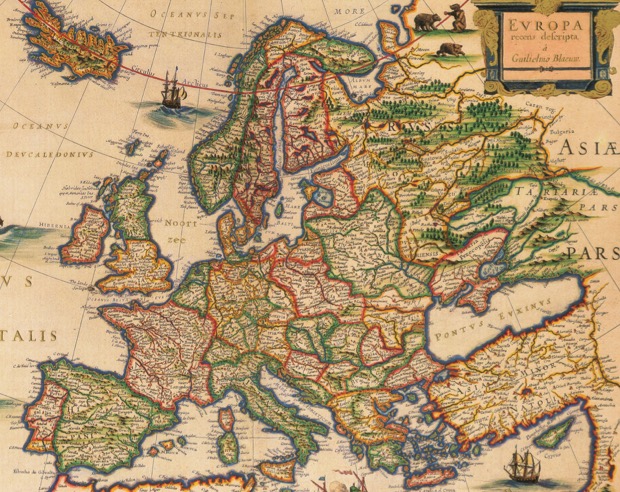Part I: Unfettered reason cannot conserve anything.
The Global Community is a Fantasy

Detractors of nationalism indulge in dreamcasting over statesmanship.
In March 2019 a group of Catholic and Catholic-adjacent writers and academics issued a manifesto titled ‘Against the Dead Consensus’ (which I hereafter abbreviate ADC). As one of the signatories to that manifesto, I admit to being surprised at the way a single clause—“we embrace the new nationalism”—has come to define the document within certain intellectual circles.
ADC is first and foremost a statement about conservatism. It critiques the corrosive afterlife of “warmed-over Reaganism” within conservative circles across multiple dimensions including social class, the family, and democracy. Yet public debate has chosen to define the document as a discourse on nationalism.
An open-letter response, ‘Against the New Nationalism’ (hereafter abbreviated ANN), is the most prominent reaction of this kind. Published in August in Commonweal magazine and signed by nearly two dozen tenured professors at some of the country’s most prestigious academic institutions (ADC doesn’t even count half a dozen professors), this second manifesto is dedicated to a critique of all those “eager to embrace nationalism as compatible with Christian faith.”
Some of those associated with ANN have elaborated this case in subsequent writings. In September David Albertson and Jason Blakely wrote as Catholics critiquing “Catholic involvement” in theorizing nationalism today. In November William Cavanaugh followed with a long piece based on Catholic moral theology, castigating both nations and nationalism as well as the “First Things crowd” for defending them and in the process having “cozied up to the ‘Trump phenomenon’.” In December Commonweal co-editor Matthew Sitman delivered about as all-encompassing a condemnation possible, castigating ADC signatories as theocratic enemies of democracy, “human equality,” and the rule of law itself.
We are having this debate because the terms of solidarity in America are in flux as they have not been in fifty years. Centrifugal forces of globalization, the digital technological revolution, de-Christianization, and the collapse of the working-class family have scattered old ways and old ideas. The most fundamental political questions of attachment and belonging need to be asked and answered anew. Not least among these questions is that concerning the attachments and consequent moral obligations of political community.
Unfortunately those associated with ANN offer no positive answer to these questions. They say little on the central matter of citizenship, and what they do say is discouraging and dismissive. While the history of nations and nationalism is certainly checkered with violence, so, too, has the nation been the foundation of modern political liberty and class solidarity. Its promise animated rebellions against tyrants and the establishment of democracy. It fueled the demise of Eastern empires and Western colonialism alike. The nation is the ground of equality that makes self-government meaningful and the welfare state possible.
The Nation: Flawed but Necessary
In my view, no ADC signatory should take the nation or nationalism to be natural and unproblematic.
The manifesto itself is careful to state, “We embrace the new nationalism insofar as it stands against the utopian ideal of a borderless world that, in practice, leads to universal tyranny” (emphasis added). Short of the globalist dystopia (if you don’t believe us that a global polity would be so, perhaps you’ll believe Immanuel Kant), every community necessarily partakes of boundaries.
Our obligations to spouse or children are different from our obligations to our neighbors, which are again different from our obligations to fellow citizens—and they different yet again from those to foreigners. The Church as a community parallel to all these makes matters even more complex. But as a political community, only the nation provides the uniquely political framework within which the common good can be both envisioned and enacted.
ADC’s critics are keen to skip quickly past such facts and get right to the anathemas.
Thus ANN can only wait until its second paragraph to draw analogies between First Things and the Reich Church of Nazi Germany. It saddles us with the full depth and breadth of Trumpian language and policy when ADC clearly states in its preamble that its signatories are arrayed across the 2016 electoral spectrum. Cavanaugh jabs at the way nationalism “occlud[es] the urgent issue of class,” ignoring ADC’s expectation of “a country that works for workers.” All critics equate nationalism to ‘ethnonationalism’ and beyond to white supremacy, despite ADC’s insistence that all Americans are “our countrymen” and “our fellow citizens.”
But to focus on these slings and arrows is to miss the important underlying debate. The fundamental political priority animating ADC is community. Its presumption is that centrifugal forces are undermining our common life and our ability to even conceive of the common good. This is why we invoke nationalism and the nation in the first place.
The critics do helpfully recognize the disintegration of community, and they do praise fraternity and solidarity. Yet rather unhelpfully they then play an obfuscating semantic game. ANN condemns nationalism but praises ‘patriotism.’ Albertson and Blakely do the same. In the critics’ hands, patriotism is ‘good’ attachment—a “love of the laws and loyalty to them over leader or party”—while nationalism is ‘bad’ attachment—“loyalties intended to precede and supersede law.” According to this view, patriotism orients itself toward the state while maintaining “studied indifference to religions and cultures,” while nationalism orients itself toward “religious, ethnic, and racial identities” that nationalists supposedly take to be natural and pre-political.
Students of nations and nationalism will recognize this is the all-too-familiar and overworked distinction between the ‘civic’ and the ‘ethnic.’ According to the typology, the ‘civic’ is a rational attachment uniting persons as citizens to liberal institutions and laws (although adapted to particular historical and cultural contexts). The ‘ethnic,’ on the other hand, is an irrational attachment uniting persons as members of a group with a shared history, culture, and sense of genealogical solidarity through common myths and symbols.
ANN condemns ethnic attachment in any form and fears it in every form. Both Albertson and Blakely as well as Cavanaugh refuse even to brook ‘civic nationalism’ because of its supposed “instability” and tendency to slide into ethnic nationalism. Cavanaugh is the more eloquent here, condemning First Things as a whole of plying trade in “visceral kinds of energy…the exaltation of ‘us’ and the demonization of ‘them’.”
In the real world, of course, every human group is a combination of civic and ethnic elements. To demand only the ‘civic’—or if one insists, ‘patriotic’—and the extirpation of the ‘ethnic’ is dream-casting, not political strategy. Ethnicity is a global trans-historical human phenomenon and no amount of critique is going to erase it. Ethnic attachments are real and pervasive.
Both Albertson and Blakely as well as Cavanaugh claim that “nationalist consciousness” is false or manufactured, “a large and unwieldy abstraction” and “a monoculture engineered by modern states.” This is false. The late scholar of nations and nationalism Anthony D. Smith has had the better of the debate when he showed that many nations have ethnic foundations long preceding modernity.
That being said, states clearly do manipulate the boundaries and characteristics of nations—and even if they do, so what? No human group, order, or classification is pre-political, even as politics cannot come close to a full accounting of them. That states prefer particular languages, family structures, definitions of rights and obligations, and cultural activities over others is something to which only a libertarian could object—and neither ADC nor ANN were written by libertarians.
The deeper problem with ANN and its spin-offs is the belief that ethnic attachment itself is anathema. In holding to this, they ignore the arguments of liberal nationalists who insist that the nation is the condition of possibility for both liberal values and liberal political attachment in the first place. They ignore perfectly reasonable and admirable forms of fraternity among ethnic minorities while banning ethnic majorities from the same. Most dangerously, they ignore the ample evidence that suppressing majority ethnic attachment generates political backlash that cannot be suppressed by liberal means, thus realizing their very own fears.
What do We Love, and How?
Can ethnic attachment give rise to evil? Of course, just as any form of attachment, loyalty, or solidarity can. Albertson and Blakely rightly emphasize the particular historical evil such attachment has had in the United States in the form of slavery and white supremacy. I for one am only too happy to agree with the ANN signatories when they write “xenophobia and racism…[are] grave sins” and “White supremacist ideology is the work of the anti-Christ.” But agreement here does not mean that ethnic attachment is itself nothing but a mask for racism.
The true fear animating ADC’s anti-nationalist critics is of the love of any human group smaller than universal humanity. This is why ANN winks and nods at (without stating openly) a policy of open borders; why Albertson and Blakely praise the “cosmopolitan ideal”; and why Cavanaugh extols “the universal love of all people.” This is why each in turn scorns citizenship as a moral category.
Yet wishing not to deprive us of love for any actual group of persons, ADC’s critics allow our attachment to associations that are “local or natural.” Unfortunately the anti-nationalists spend so little time elaborating what kinds of limited human groups are indeed worthy of our identification, sense of belonging, and love that it is difficult to know what the “local or natural” might be.
My guess is that it ADC’s critics are thinking of what sociologists once called Gemeinschaft, often translated as ‘community’ with an intentionally pre-modern sensibility. This is certainly what Cavanaugh seems to mean. He contrasts the supposedly uncomplicated and lamentable supremacy of the nation today with the “many loyalties to locality and priest and lord and guild and family” of Europe’s medieval period. This is the foundation of his unremitting hostility to any allegiance to “nation” or “country” or “people,” because all such loyalties supposedly legitimate the all-powerful state and its violence.
Here Cavanaugh gives an argument straight out of the communist Third International: the nation is “a large and unwieldy abstraction that mostly serves the interests of the upper classes,” while through nationalism “The resentments of working-class whites are stoked, but they are directed against racially-coded members of the same working class, while the wealthy help themselves to a greater portion of the national pie.”
Yet contrary to the famous dictum of Marx and Engels, the history of capitalism over the last century demonstrates that it is capital, not the working class, that has no country. This is precisely why ADC embraces the bonds of citizenship and clearly states “We want a country that works for workers.” And regardless of whether it is kind or cruel to say, a policy of open borders is class warfare. The contemporary relevance of Cavanaugh’s claims that “nationalism feeds war on a breathtakingly [sic] scale” and “The discourse of nationalism virtually always favours war over peace” likewise needs challenging.
Hawaii Representative Tulsi Gabbard expresses a most welcome form of nationalism in twenty-first century America, deeply hostile to the perpetual American wars of the post-WWII era. Even Donald Trump’s nationalism has been more peaceful than the foreign policies of his immediate predecessors or 2016 rivals whose wars in Afghanistan, Iraq, Syria, and Libya were birthed not by nationalism but by liberalism.
Those open to a new dialogue on nationalism and those opposed to any such conversation fundamentally disagree on the basic challenge facing twenty-first century America. Do we have too much solidarity or too little? Is our communal glue too sticky or not sticky enough? The ADC manifesto clearly asserts the latter. Doing so presents a critique as applicable to the right as to the left.
No Other Way
It is easy to forget that ADC is directed first and foremost against conservatives’ long-standing “fetishizing of [individual] autonomy” and the so-called ‘four freedoms’ of neoliberalism. While conservative liberals, not to mention outright libertarians, have less concern for solidarity when liberty is as stake (as for them it always is), I would have thought that critique from the Left would be more sympathetic to ADC’s interest in solidarity and the welfare of the working class. Yet instead we get only ANN swipes like “The politics of xenophobia…dressed up in high-minded social critique” or Sitman’s judgment of ADC signatories as charlatans and frauds.
Those who find our communal glue too sticky offer up paper-thin constitutional patriotism or an abstract love for humanity. These are not the groundings of a realistic political project of solidarity. George Washington’s “great republic of humanity at large” quite frankly does not exist. There are no such things as “citizens of the world” because there is no actually existing global polity of which one could possibly be a member. For better or worse, the nation is the only grounding of democracy and republicanism that is ready and available in the world today.
As the French philosopher Pierre Manent argues, in the contemporary period only the nation has been able to produce the plane of equality upon which democracy itself is built. This incorporates political as much as social democracy. Equal rights and equal justice require a really existing political community organized on a democratic basis. In fact, appeals of black Americans to their status as Americans were necessary (if not sufficient) to end legal segregation and extend the welfare state in the 1960s and 1970s.
Every political community is necessarily delimited by boundaries of territory and membership. It does not follow, however, that the United States government is right to separate families at its southern border (as did not only the Trump administration but the Obama administration before it). Nor does it mean the United States should establish a near-closed border immigration regime as in Japan (something not even Trump advisor Stephen Miller advocates). Nor does it suggest the correctness of a radical reduction in America’s intake of refugees (which the Trump administration has accomplished to its shame). But it does mean that no matter how much one desires it, the “foreigner” and the “stranger” cannot be simply willed out of existence—at least short of willing out of existence politics itself.
We are left with the inescapable necessity of debating the purposes of a national immigration policy, a national trade policy, a national monetary policy, a national industrial policy, and every other policy carried out necessarily by the national government in the interests of the nation. As ADC indisputably concludes, “Whatever else might be said about it, the Trump phenomenon has opened up space in which to pose these questions anew.” No member of the “First Things crowd” thinks he or she has all the answers. That’s why we so vigorously support the debate in the first place.
The American Mind presents a range of perspectives. Views are writers’ own and do not necessarily represent those of The Claremont Institute.
The American Mind is a publication of the Claremont Institute, a non-profit 501(c)(3) organization, dedicated to restoring the principles of the American Founding to their rightful, preeminent authority in our national life. Interested in supporting our work? Gifts to the Claremont Institute are tax-deductible.
The ugly history of a divisive ideology
Mad crowds and pseudo-events wrack Barcelona.
Resurgent national sovereignty movements are back and validated by expanding electoral mandates.
Notes on the ground from a soul-sick Santiago.






